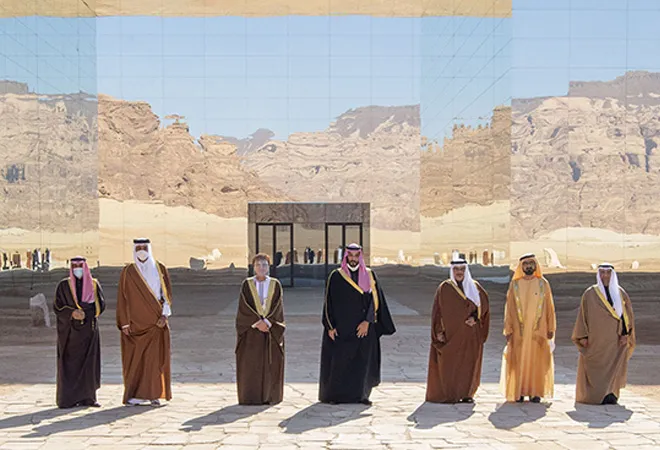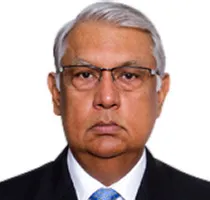-
CENTRES
Progammes & Centres
Location
Ties between Qatar and the three GCC members went downhill after uprisings in Arab countries that began in Tunisia, the beginning of the so-called “Arab Spring”.

The Saudi Crown Prince Muhammad bin Salman greeting the Emir of Qatar, Sheikh Tamim bin Hamad Al Thani, upon the latter’s arrival at the airport in Saudi Arabia heralded the new year. Arguably, it marks the beginning of a significant geopolitical step towards reconciliation among the Gulf Arab nations. It must have surprised many in the Arab world and may have caused some concern in Iran and Turkey, as both countries have taken advantage of dissensions among the Gulf Arab nations. Qatar, an estranged member of the six-country regional organisation, the Gulf Cooperation Council (GCC) founded in 1981, had been at loggerheads with Saudi Arabia, Bahrain and the UAE since 2017 over its policies that came into conflict with those of the three fellow Arab nations.
These policy differences related to ties with Iran, support for the Muslim Brotherhood, support to different factions in the ongoing civil war in Libya and Syria, and the editorial slant of the Qatar-owned Al Jazeera media group. The differences were serious enough for the three GCC countries and Egypt to cut off ties and blockade Qatar, which has a land border only with Saudi Arabia. The GCC convened its 41st Annual Summit on January 5 at Al-Ula in Saudi Arabia and the Qatari Emir was invited to attend, after reconciliation agreements were worked out behind the scenes. It was Kuwait that mediated in the dispute and announced that Saudi Arabia and Qatar had agreed to restore full diplomatic, land, air and sea links, which had been cutoff in June 2017. During the summit, the Gulf leaders signed a “solidarity and stability” agreement.
Ties between Qatar and the three GCC members went downhill after uprisings in Arab countries that began in Tunisia, the beginning of the so-called “Arab Spring”. As these uprisings spread to other Arab countries, these wealthy GCC members aided and supported preferred local factions in Syria and Libya, while Qatar chose to support opposing factions, leading to charges against Doha of supporting terrorism. In Libya, for instance, Qatar, Italy and Turkey are supporting the UN-recognised Government of National Accord (GNA) that is locked in a civil war with General Khalifa Haftar’s Libyan National Army (LNA), which has received support from Saudi Arabia, the UAE, Russia, France and Egypt. Gen Haftar had helped Col Muammar Gaddafi usurp power in 1969 and is reported to have joined hands with the CIA to overthrow Gaddafi in the 1990s.
Ties between Qatar and the three GCC members went downhill after uprisings in Arab countries that began in Tunisia, the beginning of the so-called “Arab Spring”. As these uprisings spread to other Arab countries, these wealthy GCC members aided and supported preferred local factions in Syria and Libya, while Qatar chose to support opposing factions
Suspicions were also raised by Qatar’s friendly relations with Iran, a major player in the regional power struggle with Saudi Arabia and her Gulf allies. In 2014, Saudi Arabia, the UAE and Bahrain recalled their ambassadors from Doha. Though the ambassadors returned to Doha after a few months, an insecure Qatar, with meagre military resources of its own, felt threatened by a far more powerful Saudi Arabia. It did what nations tend to do in such situations—it reached out to allies like the US, whose CENTCOM is based at the Al-Udeid air base in Qatar. It also reached out to Turkey, which has been spreading its wings in West Asia in its quest for influence and leadership of the Islamic world.
Qatar permitted Turkey to open a military base and start training Qatari military and security forces. This led to a further deepening of the hostilities between Qatar and the three GCC nations, and ties plummeted. In June 2017, Qatari ambassadors were expelled and an economic blockade was imposed. Immediate closure of the Turkish military base was one of the main demands. This led Qatar to start an ambitious expansion of its military and security forces. Bahrain has had several disputes with Qatar over their maritime boundary.
Qatari Coast Guard ships have intercepted Bahraini ships and Doha has complained that Bahraini Air Force fighter aircraft have flown over her territorial waters. Qatar’s oil and gas resources have made it the world’s richest country in per capita income. Its wealth enabled it to beat the blockade and the deadlock had reached its expiry date, as it was going against the interest of all GCC countries. Pressure has also been building for joint action against the Covid pandemic and the need for economic measures to revive flagging economies.
Clearly, there was strong US pressure to resolve the impasse and the presence of Jared Kushner, President Donald Trump’s son-in-law and adviser, at the Al-Ula Summit confirms the American role. The priority of the US is to keep the GCC together and consolidate a common front against Iran. The reconciliation in the GCC is only the first step. There are simmering differences that will require sustained effort to resolve. Clearly, Saudi Arabia has taken the lead and MbS has attempted to play a statesman’s role in the reconciliation effort.
As the sun sets on the Trump administration, the GCC has to reckon with Iran’s growing nuclear and missile capabilities. The incoming Joe Biden administration in the US has indicated its preference for rejoining the Iran nuclear deal (JCPOA). Iran’s announcement that it has resumed enriching uranium to 20% and its seizure of a South Korean tanker have not gone unnoticed. Clearly, Iran is raising the stakes and repositioning itself for negotiations with the incoming Biden administration.
Iran’s announcement that it has resumed enriching uranium to 20% and its seizure of a South Korean tanker have not gone unnoticed. Clearly, Iran is raising the stakes and repositioning itself for negotiations with the incoming Biden administration
The Obama administration’s support for the nuclear deal with Iran was deeply unpopular not only in Israel, but also in the Gulf countries. Iran and her military proxies in Lebanon, Iraq, Syria and Yemen are viewed as security threats by the GCC. The reconciliation is also a signal to the US that her GCC allies have their reservations about potential accommodation of Iran by the Biden administration.Having nurtured good ties with all GCC countries, India will have cause to be satisfied with the reconciliation effort. India’s energy ties with the GCC countries and the large Indian expatriate community in these nations are important bonds.
Saudi Arabia and Qatar are important suppliers of oil and natural gas to India. Post-Covid economic recovery in the GCC nations will aid India’s economic recovery as well, as these countries are major trading and investment partners as well as employment destinations for Indian workers. With the UAE, Bahrain and Morocco establishing full diplomatic ties with Israel, India will have reason to be satisfied, given the close security ties it has with Israel. Whether the reconciliation will help the Turkey-Pakistan axis will depend on how Qatar plays its cards. It is very likely that Qatar will attempt to balance its ties with the GCC and the Iran-Turkey axis.
This commentary originally appeared in The New Indian Express.
The views expressed above belong to the author(s). ORF research and analyses now available on Telegram! Click here to access our curated content — blogs, longforms and interviews.

Pinak Chakravarty was a Visiting Fellow with ORF's Regional Studies Initiative where he oversees the West Asia Initiative Bangladesh and selected ASEAN-related issues. He joined ...
Read More +